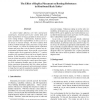Free Online Productivity Tools
i2Speak
i2Symbol
i2OCR
iTex2Img
iWeb2Print
iWeb2Shot
i2Type
iPdf2Split
iPdf2Merge
i2Bopomofo
i2Arabic
i2Style
i2Image
i2PDF
iLatex2Rtf
Sci2ools
P2P
2006
IEEE
2006
IEEE
The Effect of Replica Placement on Routing Robustness in Distributed Hash Tables
To achieve higher efficiency over their unstructured counterparts, structured peer-to-peer systems hold each node responsible for serving a specified set of keys and correctly routing lookups. Unfortunately, malicious participants can abuse these responsibilities to deny access to a set of keys or misroute lookups. We look to address both of these problems through replica placement. Using Chord as an example, we present an equally-spaced replication scheme and prove that it can be tuned to produce any desired number of disjoint routes. To be specific, we prove that d disjoint routes can be produced by placing 2d−1 replicas around a fully populated Chord ring in an equally-spaced fashion. In this situation, we also prove that there exists a route to at least one replica, which contains only uncompromised nodes, even if an attacker controls more than a quarter of the contiguous identifier space in the system. Simulation experiments demonstrate that this scheme performs better than...
Disjoint Routes | Equally-spaced Replication Scheme | P2P 2006 | Peer-to-Peer Computing | Replica Placement |
Related Content
| Added | 12 Jun 2010 |
| Updated | 12 Jun 2010 |
| Type | Conference |
| Year | 2006 |
| Where | P2P |
| Authors | Cyrus Harvesf, Douglas M. Blough |
Comments (0)

